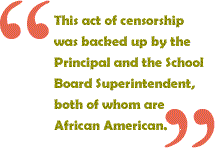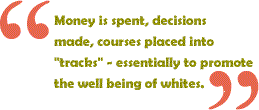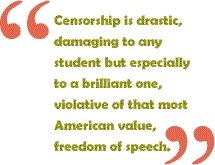|
This
commentary was first published by Alabama
Public Radio.
A
little over a year ago, a junior at Lee High School in Huntsville,
AL, acknowledged her anger and decided she wasn't going to take
it any more. She was tired of hearing the "n" word
- that is, "nigger" - used to describe blacks by her
white schoolmates. An accomplished poet, Kohl Fallin struck
back with words. She wrote a poem.
 "Your
Perception, My Reality" speaks directly to the experience
black folks have, and have had for hundreds of years, in a country
dominated by white folks. "We are worth more than your
pale white skin," she begins, refusing right from the start
to accept the lower status that many whites think blacks are
supposed to have. "Mediocre and below is what we are supposed
to amount to in your mind," she says. "When I hear
these words come out of your mouth it makes me want to slap
the white off you and leave you with some sense." "Your
Perception, My Reality" speaks directly to the experience
black folks have, and have had for hundreds of years, in a country
dominated by white folks. "We are worth more than your
pale white skin," she begins, refusing right from the start
to accept the lower status that many whites think blacks are
supposed to have. "Mediocre and below is what we are supposed
to amount to in your mind," she says. "When I hear
these words come out of your mouth it makes me want to slap
the white off you and leave you with some sense."
White
domination because of the accident of a pale skin color is absolutely
senseless, as Kohl says. Taking away whiteness with a slap will,
she thinks, bring her tormentors to their senses, because they
will then no longer have their marker of superiority. "I
have news," Kohl continues, "[W]e are already ahead.
Some of us are strong, proud, sophisticated and more."
With sense, whites will see the reality of equality, in multifold
differences and multifold abilities among us all.
Moreover,
such illicit power itself hurts the dominant, Kohl charges;
it brings a submergence of the beauty of difference. "Birds
of a feather flock together. Your flock has blond hair and blue
eyes. The flock is exclusive and all the same, different identities
are not allowed." In their whitewashing clubbiness, Kohl
understands, whites lose their own individualities. Black is
beautiful because it is thoughtful and independent, while white
is mean, thoughtless, mindlessly conformist. Kohl Fallin has
turned the white world on its head.
Wisdom,
courage, perception, the ability to put hard truth into powerful
words, are obviously not qualities reserved to those we perhaps
self-servingly call adults. Kohl's poem is indeed mature and
powerful.
Lee
High School has a prize-winning in-school literary magazine,
Expressions. Kohl's creative writing teacher urged her to submit
the poem. She did, and the editorial board composed of black,
white, and Asian students accepted it. The faculty sponsor of
the magazine, however, refused to publish the poem. This act
of censorship was backed up by the Principal and the
School Board Superintendent, both of whom are African American.
When Kohl's outraged parents tried to appeal to the whole School
Board, they were denied on a gross technicality, the lone African
American on that Board also solitary in dissent.
The
only reason given for this censorship, so far as I can determine,
is that "slap[ping] the white off" of her classmates might insult white high school students. This
is an overtly racist reason, especially given the fact that
her words were written in response to white use of the word
"nigger," obviously and intentionally insulting to
black students "mistreated in an awful way," as one
of Kohl's African-American classmates and a member of the Expression
student staff put it.
of her classmates might insult white high school students. This
is an overtly racist reason, especially given the fact that
her words were written in response to white use of the word
"nigger," obviously and intentionally insulting to
black students "mistreated in an awful way," as one
of Kohl's African-American classmates and a member of the Expression
student staff put it.
The
problem is, many whites do not see what happened to Kohl Fallin
as racism. Protecting white children from insulting racial statements
is good. Protecting black children from insulting racial statements
is impossible. This juxtaposition, this paradox, this craziness
is - to most whites - just "natural."
Let
me give you an example from my own neck of the woods. In Tuscaloosa,
many privileges are given to or made available chiefly for white
students - advanced courses in high school, the dismantling
of a single all-city high school in favor of two new schools
in mostly white areas (and one old school in a mostly black
area), other new elementary and middle schools, busing from
inner city white neighborhoods to these new schools in distant
exurbs. Why? To "keep whites in the public school system."
Little recognition is given to the miserable social and economic
conditions which push blacks away from the system, or to the
supposedly neutral policies which effectively segregate and
miseducate most blacks once they are in that system. Money is
spent, decisions made, courses placed into "tracks"
- essentially to promote the well being of whites. And many
whites I have listened to think this is "normal" and
certainly not racist.
It
is even worse than I have been saying. As in Kohl Fallin's instance,
high-placed black adults go right along with this sort of racism,
even facilitate it, probably to save their jobs and to appease
an aroused white-dominated power structure. One outraged writer
in the Huntsville Times found these African-American authority
figures "miserable creatures, having to serve at the pleasure
of the white establishment, even to the detriment of African
American youth."
 You
heard me correctly. Blacks can participate in racist actions
against blacks. What I am talking about is institutional racism.
Racism built into the system, into the culture, into the hearts
and minds of all of the folks who live in a nation whose history
for many centuries has been shot through with racist decisions,
racist attitudes, racist preferences, racist wealth allocation.
Racism as a natural and inescapable part of a power structure
which protects the wealthy and powerful, and which the few African
Americans who have recently entered positions within the power
structure oppose at their peril. You
heard me correctly. Blacks can participate in racist actions
against blacks. What I am talking about is institutional racism.
Racism built into the system, into the culture, into the hearts
and minds of all of the folks who live in a nation whose history
for many centuries has been shot through with racist decisions,
racist attitudes, racist preferences, racist wealth allocation.
Racism as a natural and inescapable part of a power structure
which protects the wealthy and powerful, and which the few African
Americans who have recently entered positions within the power
structure oppose at their peril.
While
rarely a matter of that overt intentionality so precious to
individualists and liberals - mostly white - who smugly assure
themselves that they have conquered their own racism, institutional
racism nevertheless operates through people, and it chews up
human beings and spits them out. Censorship is drastic, damaging
to any student but especially to a brilliant one, violative
of that most American value, freedom of speech. Censorship sets
a terrible model for training young Americans to be open with
their feelings, to express themselves, to think and act for
themselves, to be active citizens in a free democracy. Yet racist
censorship was visited upon Kohl Fallin by her high school authorities,
and it has not been corrected despite her strenuous efforts
and those of her parents and other allies. Racism is with us
still.
Wythe Holt is a lawyer, historian, and
writer who lives in Alabama, who is mad as hell and isn't
going to take it any more, and who works to eliminate institutional
racism.

www.blackcommentator.com
Your
comments are welcome. Visit the Contact
Us page for E-mail or Feedback.
Click
here to return to the home page
|

